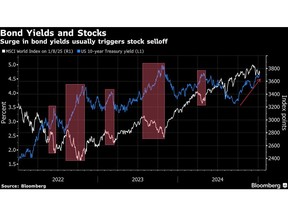Article content
(Bloomberg) — Asian stocks were poised for a mixed open after Wall Street traders refrained from making big bets, with US equity markets set to close ahead of Friday’s jobs report.
Asian stocks were poised for a mixed open after Wall Street traders refrained from making big bets, with US equity markets set to close ahead of Friday’s jobs report.

(Bloomberg) — Asian stocks were poised for a mixed open after Wall Street traders refrained from making big bets, with US equity markets set to close ahead of Friday’s jobs report.
Article content
Article content
Shares in Sydney opened lower Thursday, while futures for Hong Kong fell and contracts for Tokyo were little changed. S&P 500 futures were steady after the benchmark swung between small gains and losses throughout the session Wednesday, closing slightly higher as the tech-heavy Nasdaq 100 ended little changed. Nvidia Corp. dipped in post-market trading after a report that the Biden administration plans one additional round of restrictions on the export of artificial intelligence chips.
Advertisement 2
Story continues below
Article content
The S&P 500 reclaimed the 5,900 psychological mark after briefly falling below it. The dollar gained against its major currency peers. Treasuries stabilized as a solid $22 billion sale brought a degree of relief after the recent selloff, while Australia’s 10-year yield edged higher in early trading.
Key data in Asia on Thursday will be China’s inflation reading. Headline CPI likely weakened further while factory-gate prices stayed well below year-earlier levels, according to Bloomberg Economics. That’s a sign that stronger government stimulus has yet to spur a meaningful rebound in demand, BE said.
The options market is betting the S&P 500 will move roughly 1.2% in either direction after the upcoming US employment data, according to Citigroup Inc. That would be the biggest implied move on a jobs day since September.
US employers probably tempered their hiring last month to wrap up a year of moderating yet still-healthy job growth that economists expect to carry on in 2025. A survey conducted by 22V Research showed most investors are watching payrolls closer than normal. Only 26% of the respondents think Friday’s data will be “risk-on,” 40% said “risk-off,” and 34% “mixed/negligible.”
Article content
Advertisement 3
Story continues below
Article content
“Investors will want to see a return to Goldilocks data, consistent with a cooling labor market to help temper the recent spike in yields and help stocks stabilize,” said Tom Essaye at The Sevens Report.
The latest Federal Reserve minutes didn’t break any significant ground, showing officials adopted a new stance on rate-cutting amid elevated price risks, deciding to move more slowly in the months ahead. Meantime, Fed Governor Christopher Waller said he believes inflation will continue to cool toward the central bank’s 2% target.
US stock markets will close Jan. 9, in observance of a national day of mourning for former President Jimmy Carter. The bond market will close at 2 p.m. New York time.
The yield on 10-year Treasuries was little changed at 4.69% on Wednesday. The 20-year yield, a laggard on the US government debt curve since its re-introduction in 2020, briefly topped 5%.
The recent slide in stocks and bonds could worsen as traders fret over the prospect of higher inflation and interest rates, but the decline is unlikely to reach the extremes seen in 2022 when markets weathered their worst year since the global financial crisis, according to Morgan Stanley’s Mike Wilson.
Advertisement 4
Story continues below
Article content
The bank’s chief US equity strategist expects a choppy first half of 2025 and an improved second part of the year, he said during an interview with Bloomberg Television on Wednesday. The difference between now and then is that the Fed in 2022 was aggressively raising interest rates at a pace that is unlikely going to be repeated in the foreseeable future.
There’s room for stocks to fall further as bond yields approach levels that have been painful for equities in recent years.
“Equity/bond yield correlations have turned negative again,” Goldman Sachs Group Inc. strategists including Christian Mueller-Glissmann wrote in a note, stressing that if yields keep going up without good economic data, it will hit equity markets. “With equities having been relatively resilient during the bond selloff, we think near-term correction risk is somewhat elevated in case of negative growth news.”
Corporate Highlights:
Advertisement 5
Story continues below
Article content
Key events this week:
Some of the main moves in markets:
Stocks
Currencies
Cryptocurrencies
Bonds
Commodities
This story was produced with the assistance of Bloomberg Automation.
Article content
Comments